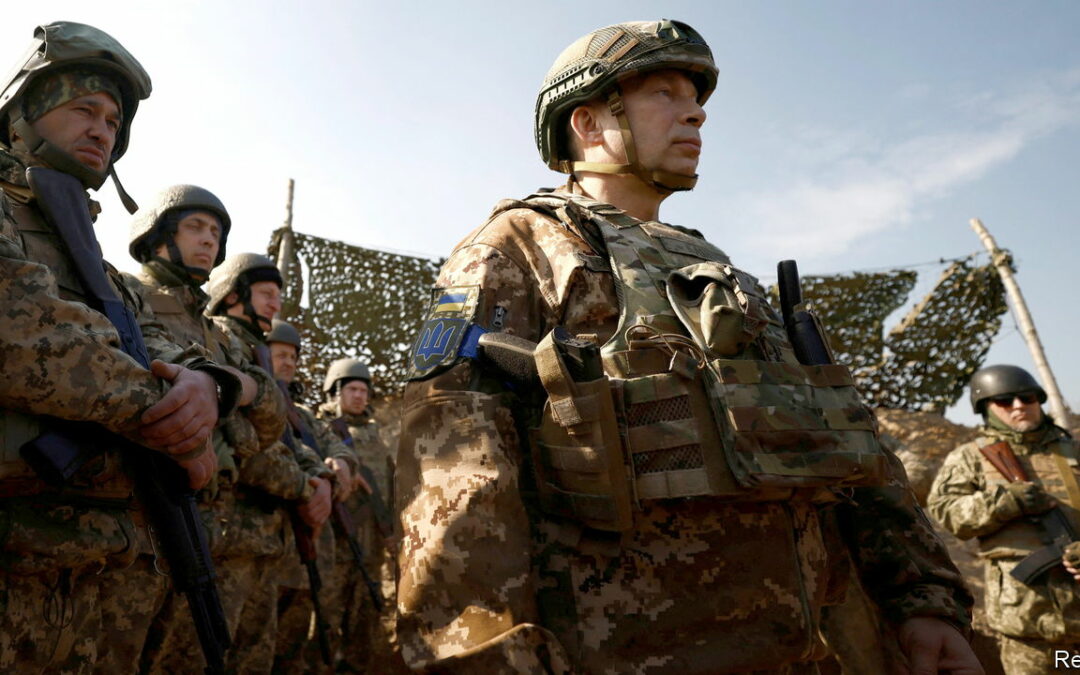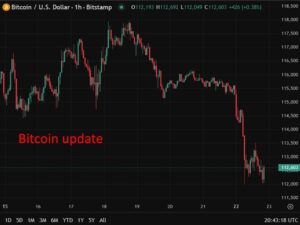THE TACTICS of Valery Zaluzhny, the overall commander of Ukraine’s armed forces, will be studied by military historians. But the fate of the country rests upon the shoulders of other men further down the chain of command, too—among them Colonel-General Oleksandr Syrsky, who leads the country’s ground forces. Who is he, and how is he likely to prosecute Ukraine’s war effort?
General Syrsky was born in 1965 in Vladimir, then in the Soviet Union, now in Russia. He has lived in Ukraine since the 1980s. Like most people of his age in Ukraine’s armed forces he trained at the Higher Military Command School in Moscow, the Soviet Union’s equivalent of America’s West Point, alongside peers who are now Russian commanders. Before becoming head of Ukraine’s land forces in 2019 he was the ground commander for operations in the east of the country and played a prominent role in the war that began in 2014 with Russia’s invasion of Crimea. He was awarded the Order of Bohdan Khmelnytsky, which is given for “exceptional duty in defence of state sovereignty and state security”.
Colleagues describe the general as ascetic, with an addiction to gym. He is said to be an obsessive planner. Some Western analysts say that his battle tactics reflect his hierarchical Soviet training. But his operational flexibility differentiates his approach from that of Russian generals. He preaches NATO principles of decentralised command, learned during a stint in Brussels in 2013, where he met representatives of the alliance to discuss how to modernise Ukraine’s forces. He emphasises the importance of “hybrid warfare”. And he prioritises his troops’ morale: every day he reads messages from hundreds of soldiers and he regularly visits them in the field. “You must feel the spirit of the army,” he says.
In July 2021 General Zaluzhny, who is eight years younger than General Syrsky and was then under his command, was promoted over his senior to lead Ukraine’s armed forces. After the invasion General Zaluzhny became so popular that allies of Volodymyr Zelensky, Ukraine’s president, worried that he could pose a political threat. Last summer some insiders argued that General Syrsky should replace him. The ground commander may agree. Cracks of disunity have worried Western military officials. Publicly at least the generals say that they trust each other completely. In an interview with The Economist in December General Syrsky insisted: “The army is outside of politics.”
Many of Ukraine’s victories since the Russian invasion in February 2022 can be attributed to General Syrsky. That month, as Vladimir Putin’s troops massed on the border, the general ordered military hardware to be moved off bases, so the kit would not be destroyed by airstrikes in the event of war. While Mr Zelensky was playing down the risk of an attack on the capital, Kyiv, General Syrsky was preparing for one. Two rings of defence were constructed around the city, and its borders were divided between generals who were authorised to make tactical decisions. When Kyiv came under threat in March 2022 a dam on the Irpin river was blown up to flood the Russian positions and destroy their pontoon bridge in order to prevent them from approaching the city. The invaders retreated. (The destruction of the Kakhova dam on the Dnieper river on June 6th this year, believed to have been carried out by Russia, caused much wider devastation and will make it harder for Ukrainian troops to move eastward.) In April 2022 General Syrsky was made a Hero of Ukraine, the country’s highest honour.
In July he planned and executed a successful operation to push Russian troops far enough away from the city of Kharkiv so their artillery could no longer reach it. After that, life in Ukraine’s second city became a lot more tolerable. In September Ukraine’s shock counter-offensive broke through Russian lines nearby. It was General Syrsky who raised the Ukrainian flag in the liberated town of Balakliya. More recently he led the defence of Bakhmut. American military strategists argued that spending so much effort to defend a strategically insignificant town made little sense. But keeping the Russians physically and psychologically committed to a battle of attrition for such a meagre prize may have been a masterstroke.
Many more of those will be needed for Ukraine to make gains during the counter-offensive that began on June 5th. With 12 offensive brigades at its disposal, and a front of more than 1,000km along which to operate, Ukraine cannot afford to spread itself too thinly. General Syrsky’s brilliance faces a momentous challenge. ■









